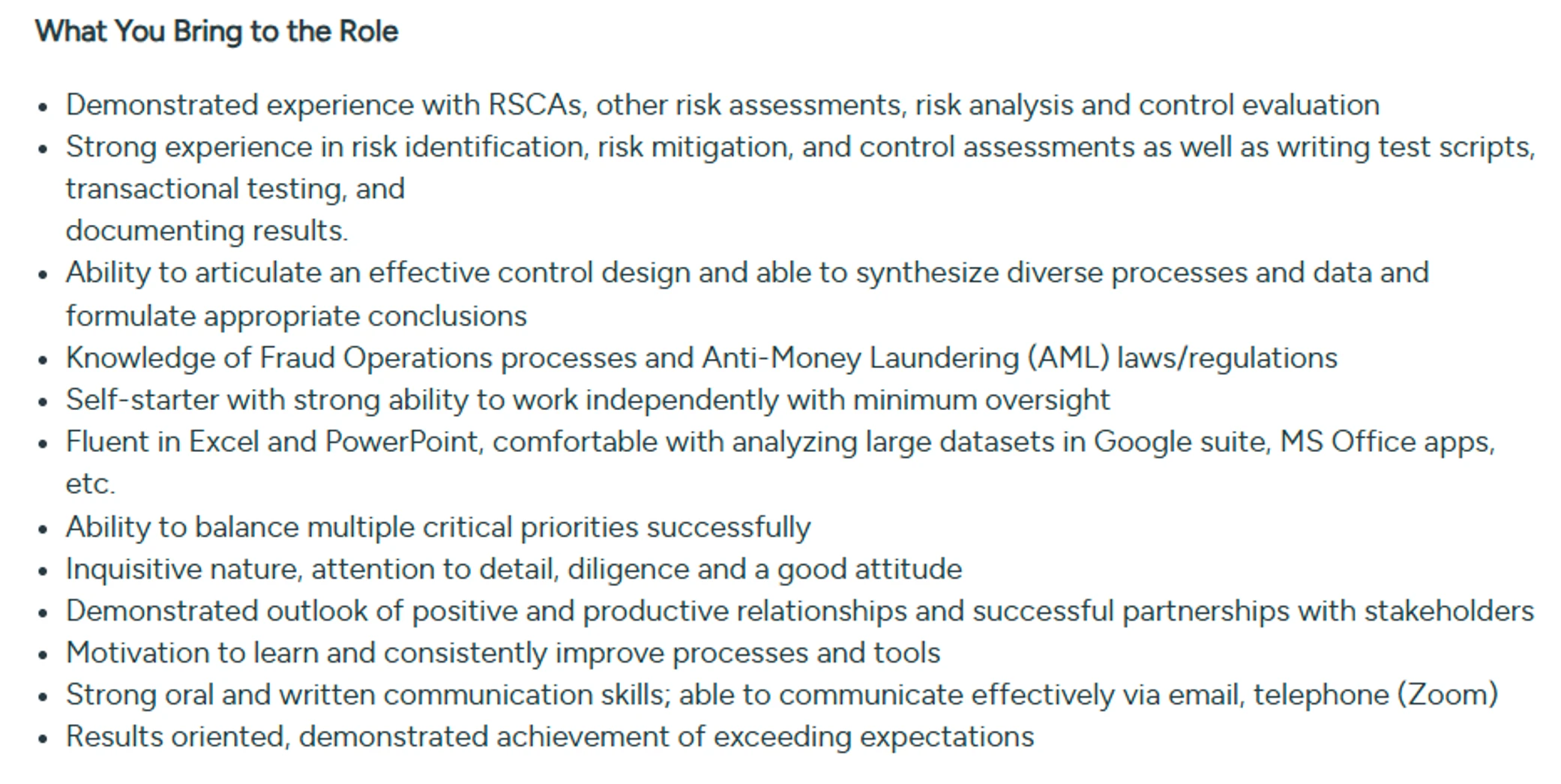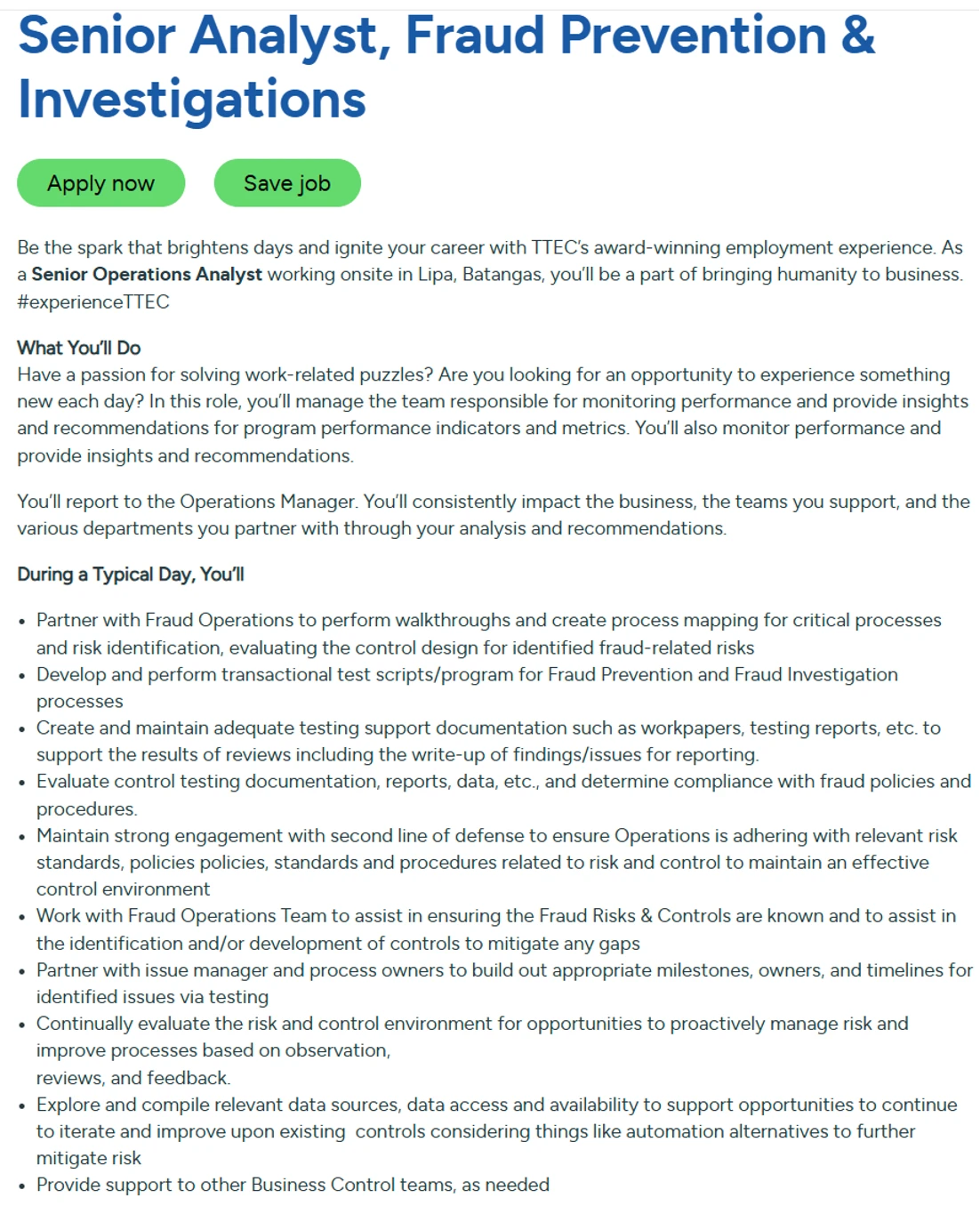What is a Fraud Analyst: Job Description & Salary Expectation

03/03/2025
Key Takeaways
- Fraud analysts are like financial detectives who use advanced technology to protect people's money from sneaky scammers.
- The job requires a mix of technical skills, critical thinking, and the ability to spot tiny anomalies in massive amounts of data.
- Fraud analysis is an exciting career path with opportunities to grow from entry-level roles to specialized positions in cybersecurity and risk management.
- Salaries can range from $50,000 to over $100,000, depending on experience and specialization.
- TTEC features an innovative environment for fraud analysts to develop cutting-edge skills and make a real impact in financial crime prevention.
What Exactly Does a Fraud Analyst Do?
The Financial Superhero Job Description
Imagine having a job where you're basically a financial superhero, protecting people's money from sneaky scammers. That's a fraud analyst in a nutshell! These digital detectives use cutting-edge technology to track down suspicious activities faster than you can say "transaction denied."
Breaking Down the Role
Fraud analysts are the defenders of the financial world. They spend their days diving deep into mountains of data, using smart software and razor-sharp investigative skills to spot anything that looks even slightly suspicious. Think of it like being a modern-day Sherlock Holmes, wielding powerful data analysis tools instead of a magnifying glass.
Where Fraud Analysts Make Their Mark
You can find fraud fighters across nearly every industry that deals with money. Banks and financial institutions need them to prevent fraudulent transfers. Credit card companies rely on them to catch stolen card usage. Insurance providers depend on their skills to identify false claims. E-commerce platforms use their expertise to stop payment fraud. Online payment services and cryptocurrency exchanges all have dedicated teams of fraud analysts working to protect customers and businesses.
Join TTEC: A Global Leader in Customer & Employee Experience
TTEC, a customer experience innovator, operates across 6 continents in countries such as Greece, Poland, and India, and employs over 55,000 individuals fluent in 50 languages. Our commitment to excellence is evident in our award-winning culture, highlighted by our 2024 accolades like Top 10 Operations Teams, Silver Certification in MLT’s Black Equity Program, and recognition as one of the UK’s Best Workplaces.
With an employee satisfaction rating of 4.1 out of 5 on JobStreet, we pride ourselves on creating supportive and flexible work environments that enhance both employee and customer experiences. Find a variety of client-facing and business support roles within a company that values community connections.
Find Your TTEC SparkA Typical Day in the Life
What to Expect
Your morning might start by reviewing overnight transactions, using advanced analytics tools to flag suspicious patterns and check alerts from automated fraud detection systems. As the day progresses, you'll dive deep into flagged transactions, gathering evidence and tracking suspicious activity.
You'll spend time communicating with different departments to verify information, compile detailed reports, and prepare documentation that could be used in potential legal proceedings. The job requires you to recommend prevention strategies and stay one step ahead of increasingly sophisticated fraudsters.
Real-World Scenarios
Credit card fraud often targets high-value travel bookings like first-class international flights.One common tactic involves criminals booking a $5,000 flight departing within 24 hours, knowing the legitimate cardholder will find out about the charge after it's too late. Another prevalent scheme is card testing, where fraudsters make small transactions like seat assignments or baggage fees to verify stolen card information before making larger fraudulent bookings.
Some fraudsters exploit complex travel booking systems through refund manipulation, making legitimate-looking bookings with stolen cards and then canceling to obtain refunds. Others use payment method switching, starting reservations with valid payment methods and then changing to fraudulent ones closer to service delivery.
These scenarios highlight why fraud analysts are crucial - they're looking beyond obvious red flags, piecing together sophisticated patterns that can cost companies millions in losses.
Skills for Success

Technical Toolkit
Successful fraud analysts are masters of technology. Your digital arsenal should include proficiency in data analysis tools, advanced skills in SQL and Excel, and a solid understanding of data visualization software. Programming knowledge in Python or R can significantly improve your capabilities, allowing you to develop custom analysis scripts and automate complex investigative processes.
Analytical Superpowers
Beyond technical skills, fraud analysts need a unique set of cognitive abilities. Microscopic attention to detail is your greatest weapon - the ability to spot the tiniest anomaly that others might miss. Critical thinking skills transform you from a mere data processor to a true financial detective. You'll need to connect seemingly unrelated dots, recognize patterns, and draw insights that appear hidden at first glance.
Soft Skills That Make a Difference
Communication is your greatest asset. The best fraud analysts can translate complex technical findings into clear, understandable language. You'll need to explain intricate investigative trails to colleagues, management, and potentially legal teams. This means breaking down sophisticated financial patterns into simple, compelling narratives.
Key Competencies
Essential skills include:
- Advanced data analysis
- Pattern recognition
- Problem-solving
- Patience and persistence
- Strong ethical standards
- Adaptability to emerging technologies
- Ability to work under pressure
Continuous Learning
The fraud is constantly evolving. Successful analysts are perpetual learners, always staying ahead of new fraud techniques, emerging technologies, and sophisticated scamming methods. Your ability to adapt and learn quickly will be your most valuable asset in this field.
Educational Background and Certifications
Most fraud analysts come from backgrounds in finance, accounting, computer science, information technology, cybersecurity, or criminal justice. While there's no single path to success, continuous learning is key. Certifications like Certified Fraud Examiner (CFE), Certified Information Systems Security Professional (CISSP), or Certified Information Security Manager (CISM) can significantly boost your career prospects.
Salary Expectations and Career Growth
The average fraud analyst salary is $53,941, with a typical salary range between $48,714 and $65,058. Salary ranges can vary widely depending on several key factors, including education, certifications, additional skills, and years of professional experience.
Entry-level fraud analysts typically start around $50,000 per year, with mid-career professionals earning between $65,000 and $85,000. Experienced analysts can push past $100,000, depending on their specialization, location, and the complexity of their role.
The career path is incredibly exciting. You might start as a junior fraud analyst and progress to senior roles, become a fraud management specialist, or even transition into consulting or cybersecurity. Some analysts move into risk management or become forensic investigators, constantly expanding their skills and impact.
Salary estimates in this article are based on publicly available data at the time of writing and may not reflect official TTEC compensation. Refer to TTEC’s official job postings for the most accurate and up-to-date salary details.
Apply for a Fraud Analyst Role at TTEC

Why TTEC is Different
We're a workplace that truly cares about your growth, well-being, and potential. Recognized as a top employer across multiple countries, TTEC offers more than just a job - we provide a transformative career experience.
Our Commitment to Employees
TTEC has been certified as a Great Place to Work® across multiple continents, with recognition in countries including the Philippines, Mexico, Canada, and the United States.
Our approach goes beyond traditional employment. We focus on creating an inclusive work culture that supports professional development, mental and financial wellness, and celebrates diversity. We hire talented individuals and invest in their potential through an AI-powered learning platform, guided career paths, and regular coaching.
Your Fraud Analyst Journey

As a fraud analyst at TTEC, you'll work with cutting-edge fraud detection technologies, join a supportive innovative team, and make a tangible impact in preventing financial crime. We provide the tools, resources, and opportunities for you to develop sought-after skills in an environment that constantly challenges and supports your growth.
How to Apply
Ready to become a financial superhero? Your next steps are simple:
- Visit www.ttecjobs.com
- Search for "Fraud Analyst" positions
- Prepare your resume highlighting analytical skills
- Submit your application online
Apply Now - Your Future Starts Here
Frequently Asked Questions
Do I need a specific degree to become a fraud analyst?
While many fraud analysts come from backgrounds in finance, accounting, computer science, or IT, there's no single required path. What matters most is your analytical skills, tech savvy, and ability to spot patterns.
How technical do I need to be to succeed in this role?
You'll want to be comfortable with data analysis tools, SQL, Excel, and potentially some programming knowledge.
Is fraud analysis a stressful job?
It can be challenging, and for the right person, it's more exciting than stressful. You're basically a financial detective solving complex puzzles and protecting people's money. If you love problem-solving and have a keen eye for detail, you'll thrive in this role.
What's the biggest misconception about fraud analysts?
Many people think it's just about staring at numbers all day. In reality, it's more like being a digital detective - using smart technology, critical thinking, and investigative skills to uncover sophisticated fraud patterns.
Why should I choose TTEC for my fraud analyst career?
At TTEC, we're offering more than a job - we're providing a transformative career experience. We invest in your potential with cutting-edge technologies, an AI-powered learning platform, guided career paths, and a supportive environment that helps you grow and make a real impact in preventing financial crime.
Join us and thrive
Your next opportunity starts here. Whether you're actively searching or simply exploring what’s next. our Talent Community connects you with opportunities that align with your goals.
